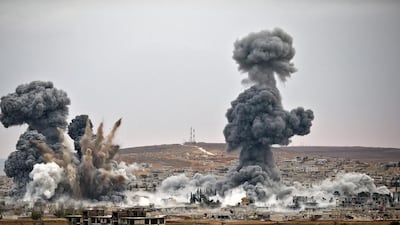ANKARA // The extremist militant group ISIL has “impaled itself” on Kobani by pouring fighters into the strategic Syrian town so they can be bombed by the US-led coalition, a senior US official said on Thursday.
Retired General John Allen, coordinator of the coalition against ISIL in Iraq and Syria, told Turkey’s Milliyet newspaper an estimated 600 fighters of the group had already been killed in airstrikes and the group would ultimately be defeated in the battle for the town.
“ISIL has in so many ways impaled itself on Kobani,” Gen Allen said.
He said ISIL had sought to make a symbol out of Kobani by defeating the Kurdish forces seeking to retain control of the town.
ISIL continues to “pour fighters” into Kobani who can then be bombed by coalition war planes, Gen Allen said, estimating air raids had killed about 600 of the extremist militants and created “real problems” for them.
“Any time you mass to achieve the affect that they are trying to achieve with respect to Kobani, you create targets,” he commented.
He said ISIL’s ultimate retreat from Kobani would indicate that it has not been able to achieve its objectives.
“I think, the sense is, if they pull out, this is going to be a real indicator that the ‘march to victory’ of ISIL has finally hit its high water mark.”
He said it was time to reverse the notion that ISIL was invincible. “And, in truth, what we are learning is that they are very defeatable.”
Gen Allen met senior Turkish officials in Ankara on Wednesday for discussions aimed at countering the threat posed by ISIL fighters, who have captured large swathes of Iraq and Syria right up to the Turkish border.
Turkey’s refusal to play a bigger role in the US-led coalition to defeat the militants has strained ties between the two Nato allies.
Ankara has called for a comprehensive strategy to remove the Syrian president Bashar Al Assad from power, and the formation of a security zone along its volatile border.
“We absolutely must consider Turkey’s national interests and special considerations. It is very clear that Turkey is a frontline state,” Gen Allen said.
The Turkish prime minister Ahmet Davutoglu held talks on security cooperation with his Iraqi counterpart Haidar Al Abadi in Baghdad on Thursday, in a sign of an easing in the long-strained ties between their countries.
Mr Davutoglu “offered Turkish military assistance to Iraq”, Mr Al Abadi said at a joint news conference, later adding that this could include arming and training members of Iraq’s planned national guard.
Iraqi volunteer forces “need training ... and we may discuss training these forces in neighbouring Turkey,” Mr Al Abadi said.
The Iraqi premier also said that he agreed to visit Turkey next month.
Mr Davutoglu’s trip to Iraq follows a visit to Turkey by the Iraqi foreign minister Ibrahim Al Jaafari earlier this month that was aimed at patching up the chilly ties between the neighbours.
Ankara’s decision to help Iraq’s semi-autonomous Kurdish region export oil has angered Baghdad, which considers it illegal.
And Recep Tayyip Erdogan, now Turkey’s president, repeatedly clashed with Mr Al Abadi’s predecessor, Nouri Al Maliki.
The two countries have also disagreed over the protracted Syrian civil war.
Shiite-majority Iraq is seen to prefer Mr Al Assad, whose Alawite sect is an offshoot of Shiite Islam. In contrast, Sunni Muslim Turkey backs the rebel groups, mostly Sunni, fighting to overthrow the Syrian president.
Previous attempts to patch up Iraqi-Turkish relations were unsuccessful but prospects appear to have improved now that the two countries both have new governments.
* Agence France-Presse

